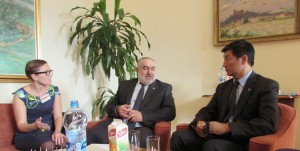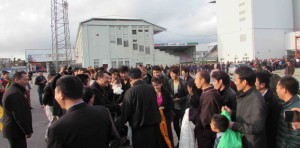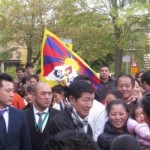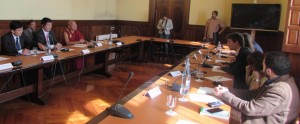
Sikyong Dr Lobsang Sangay meets Czech Senator Jaroslav Sebak (centre) in Prague on 14 October
Photo: Office of Tibet
Sikyong Dr Lobsang Sangay, the elected head of the Tibetan Government-in-Exile (CTA) began his four-nation visit to Europe by meeting members of the Czech Parliament in Prague. He discussed with Czech MPs their government’s policy on Tibet in view of its growing economic ties with China, and the Czech government’s decision to accede to China on the Tibet issue as signified by the joint declaration with China signed by the Czech Foreign Minister earlier this year. Sikyong expressed concern over their position on Tibet, despite the fact that the country is known for its stand for democracy, human rights and equality. MPs from the opposition party assured Sikyong of every possible effort to support the Tibetan cause; in a debate before the declaration with China was signed, they had accused the government of having traded the defense of human rights in China for its money.
While in Prague, Dr Sangay participated in the 18th annual Forum with around 200 global leaders from the areas of politics, academia, civil society, media, business and religion. The theme this year was “Democracy and Its Discontents: A Quarter-Century After the Iron Curtain and Tiananmen”. Sikyong took part in a panel discussion “The Significance of Vaclav Havel’s Value Based Foreign Policy”. The Forum was founded in 1996 as a joint initiative of the late Czech President Václav Havel, Japanese philanthropist Yohei Sasakawa, and Nobel Peace Prize Laureate Elie Wiesel and provides a platform for discussion on the values of democracy and respect for human rights, assisting the development of civil society, and encouraging religious, cultural and ethnic tolerance.
Sikyong arrived in Belgium on October 16 to a welcome from over 500 Tibetans. During his address to Belgium’s Tibetan community, he emphasised that the Middle-Way Approach—which is the CTA’s official policy—exists so that Tibet can gain authentic autonomy. The Sikyong also said that one of the primary reasons for visiting Belgium was to gain information about the difficulties that Tibetan asylum applicants are facing.
A crowd of 350 Tibetans warmly greeted Dr Sangay to the Netherlands on October 18, wearing traditional chubas. Sikyong responded, “I am honoured and touched by your welcome.” He addressed the Netherlands’ Tibetan community, saying “During the last three years, the present Kashag (or CTA Cabinet) has worked hard and made reasonable progress in our work, one of our greatest achievements has been the smooth transition after His Holiness the Dalai Lama devolved his political authority to the democratically-elected Tibetan leadership.” He stressed that the Middle-Way Approach is essential for improving Tibet-China relations and for gaining Tibetan autonomy. “Since the age of 16, His Holiness the Dalai Lama has tirelessly led the Tibetan people. We must always be grateful to His Holiness for his vision and wisdom, and adhere to his advices,” said Sikyong. He spoke to Dutch administrators and informed them about the difficulties that Tibetan asylum applicants were facing when applying for political refuge in the Netherlands.
During his stay in Barcelona, Dr Sangay spoke to the Catalonia Parliament’s Foreign Affairs Committee on the current situation in Tibet, saying “Since 2009, there has been 132 Tibetans who have self-immolated in Tibet. Sadly 113 have died; the Central Tibetan Administration is very concerned. We have consistently and categorically discouraged self-immolation. But, we support their aspiration calling for the return of His Holiness the Dalai Lama and freedom in Tibet.” The Sikyong completed his four-nation Europe tour with a speech delivered at Casa del Tibet (Tibet House) in Barcelona.







 Print
Print Email
Email